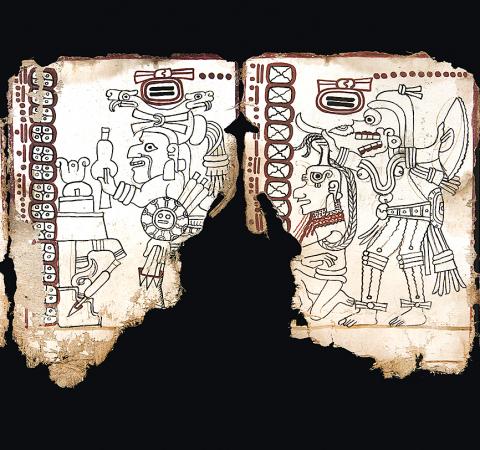Fifty-four years after it was sold by looters, an ancient Maya pictographic text was on Thursday judged authentic by scholars.
Mexico’s National Institute of History and Anthropology said the calendar-style text was made between 1021 AD and 1154 AD and is the oldest known pre-Hispanic document.
The 10 surviving pages of the tree-bark folding “book” is to be known as the Mexico Maya Codex. It was previously known as the Grolier Codex.

Photo: AP
It could have had 20 pages originally, but some were lost after centuries in a cave in the southern state of Chiapas.
It contains a series of observations and predictions related to the astral movement of Venus.
Mayan texts are written in a series of syllabic glyphs, in which a stylized painted figure often stands for a syllable.
A Mexican collector bought it in 1964, and it was first exhibited at the Grolier Club in New York in 1971. Collector Josue Saenz returned the book to Mexican authorities in 1974.
As it was looted and had a simpler design than other surviving texts, some doubted its authenticity.
“Its style differs from other Maya codex that are known and proven authentic,” the institute said in a statement.
About three other later Maya books survived an attempt by Spanish conquerors to destroy Mayan artifacts in the 1500s.
However, the institute said that because the book was written so early, it had been created in an era of relative poverty compared to the other works.
A series of chemical tests proved the authenticity of the pages and the pre-Hispanic inks used to write it, it said.
While previous studies had supported the authenticity of the text, it was the end of decades of doubts for the book.
“For a long time, critics of the codex said the style wasn’t Mayan and that it was ‘the ugliest’ of them in terms of figures and color, but the austerity of the work is explained by its epoch; when things are scarce one uses what one has at hand,” institute researcher Sofia Martinez del Campo said.

The death of a former head of China’s one-child policy has been met not by tributes, but by castigation of the abandoned policy on social media this week. State media praised Peng Peiyun (彭珮雲), former head of China’s National Family Planning Commission from 1988 to 1998, as “an outstanding leader” in her work related to women and children. The reaction on Chinese social media to Peng’s death in Beijing on Sunday, just shy of her 96th birthday, was less positive. “Those children who were lost, naked, are waiting for you over there” in the afterlife, one person posted on China’s Sina Weibo platform. China’s

‘NO COUNTRY BUMPKIN’: The judge rejected arguments that former prime minister Najib Razak was an unwitting victim, saying Najib took steps to protect his position Imprisoned former Malaysian prime minister Najib Razak was yesterday convicted, following a corruption trial tied to multibillion-dollar looting of the 1Malaysia Development Berhad (1MDB) state investment fund. The nation’s high court found Najib, 72, guilty on four counts of abuse of power and 21 charges of money laundering related to more than US$700 million channeled into his personal bank accounts from the 1MDB fund. Najib denied any wrongdoing, and maintained the funds were a political donation from Saudi Arabia and that he had been misled by rogue financiers led by businessman Low Taek Jho. Low, thought to be the scandal’s mastermind, remains

‘POLITICAL LOYALTY’: The move breaks with decades of precedent among US administrations, which have tended to leave career ambassadors in their posts US President Donald Trump’s administration has ordered dozens of US ambassadors to step down, people familiar with the matter said, a precedent-breaking recall that would leave embassies abroad without US Senate-confirmed leadership. The envoys, career diplomats who were almost all named to their jobs under former US president Joe Biden, were told over the phone in the past few days they needed to depart in the next few weeks, the people said. They would not be fired, but finding new roles would be a challenge given that many are far along in their careers and opportunities for senior diplomats can

Australian Prime Minister Anthony Albanese yesterday announced plans for a national bravery award to recognize civilians and first responders who confronted “the worst of evil” during an anti-Semitic terror attack that left 15 dead and has cast a heavy shadow over the nation’s holiday season. Albanese said he plans to establish a special honors system for those who placed themselves in harm’s way to help during the attack on a beachside Hanukkah celebration, like Ahmed al-Ahmed, a Syrian-Australian Muslim who disarmed one of the assailants before being wounded himself. Sajid Akram, who was killed by police during the Dec. 14 attack, and